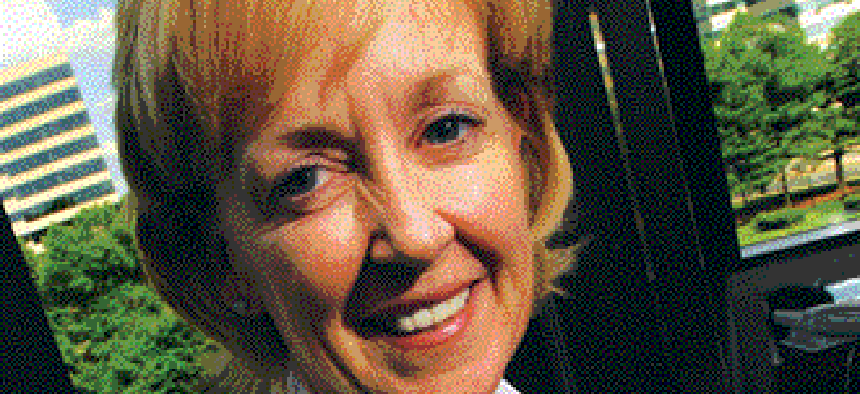Maryanne Lavan | Survival Guide: Perspectives from the field

"Ethics takes a lot of different skills," said Maryanne Lavan, vice president for ethics and business conduct at Lockheed Martin Corp. since December 2003.
How common is it for a federal contractor to have an ethics officer? In response to the defense industry procurement scandals in the 1980s, virtually all the large defense contractors created ethics offices. These included provisions for training, employee codes of conduct and disclosure rules. To whom do you report? I report to the chief executive and to a board committee. The ethics office is an independent organization with its own board. Have ethics changed over the years, or are most ethics concerns timeless? We have seen an evolution of computer-related issues, such as circulation through e-mail of bad jokes that ultimately someone finds offensive, and the use of work computers to view inappropriate Web sites. Can you give a real-life example? We presented a scenario in training in which an employee downloaded movies off the Internet during work hours. The employee said it did not measurably affect his work and "everyone does it." Our response was, "It's illegal." The company also found that computer network performance was deteriorating because of the amount of data being transferred. What types of conflict-of-interest cases come up? We had a scenario in which a subcontractor was being considered. Someone asked, "Isn't that the company that Ted's brother-in-law owns?" In those cases, we look deeper to make sure everything is disclosed and to ensure that the person with a conflict is not involved in the decision. Can you think of another example? We had another case in which our employees became friendly with government employees with whom they were working. When the father of one of the government employees passed away, the Lockheed Martin workers wanted to send flowers to the funeral. Under the gift rules, they had to adhere to the $20 limit; that is a government regulation. Relationships develop, but you have to be careful. The employees have to be cognizant of how their behavior might be perceived.What's the effect of recent contracting and lobbying scandals in Washington involving Jack Abramoff and former Rep. Randy "Duke" Cunningham? There is surprise and disappointment, but what happened to one individual is not really reflective of the rest of the industry. Our goal is to build a culture so that people witnessing that type of behavior will recognize it and will not accept it. What is the greatest challenge with ethics? Our biggest problem is not to get complacent. The issue we face is how to keep the message fresh and to keep raising the bar. In surveys of our employees, we have seen an increased commitment to ethics, and positive effects of training. The employees here are reporting less observed misconduct. [In 2005, 23 percent of Lockheed Martin employees said they observed misconduct, down 6 percent since 2003, according to Lockheed Martin's April 2006 newsletter for employees. Overall, levels of observed misconduct have dropped by 40 percent since 1995, the report said.] What do you like and dislike about your job? I love it. I feel privileged to be in this position. We are able to take data and make positive changes. What don't I like? There often is going to be someone who is unhappy. If there is [misconduct] and it is substantiated, someone has to make the tough calls, though it is not just me.
 Defining, developing and strengthening workplace ethics for the 130,000 employees of one of the nation's largest federal contractors demands the abilities of a lawyer, team leader, judge, teacher, storyteller, counselor and school principal.
Defining, developing and strengthening workplace ethics for the 130,000 employees of one of the nation's largest federal contractors demands the abilities of a lawyer, team leader, judge, teacher, storyteller, counselor and school principal.
"Ethics takes a lot of different skills," said Maryanne Lavan, vice president for ethics and business conduct at Lockheed Martin Corp. since December 2003.
Ethics issues can range from charges of conflict of interest and invasion of privacy, to allegations of theft, harassment, discrimination and improper accounting of assets.
Lavan has structured the company's ethics training, which she bases on real-life experiences of Lockheed employees, to let managers teach the employees they supervise. Together, they discuss ethical issues and decide on the best course of action.
Lockheed's ethics program includes a 24-hour help line, a broad-ranging employee code of conduct and an annual Ethics Film Festival, in which employees create two-minute videos on their own ethics dilemmas at work.
Lavan spoke recently with Staff Writer Alice Lipowicz about the role of ethics officers, changes in ethical standards and fallout from the Abramoff scandal.
WT:
Lavan:
WT:
Lavan:
WT:
Lavan:
WT:
Lavan:
WT:
Lavan:
WT:
Lavan:
WT:
Lavan:
WT:
Lavan:
WT:
Lavan:

"Ethics takes a lot of different skills," says Maryanne Lavan, vice president for ethics and business conduct at Lockheed Martin Corp.
Rick Steele
"Ethics takes a lot of different skills," said Maryanne Lavan, vice president for ethics and business conduct at Lockheed Martin Corp. since December 2003.
Ethics issues can range from charges of conflict of interest and invasion of privacy, to allegations of theft, harassment, discrimination and improper accounting of assets.
Lavan has structured the company's ethics training, which she bases on real-life experiences of Lockheed employees, to let managers teach the employees they supervise. Together, they discuss ethical issues and decide on the best course of action.
Lockheed's ethics program includes a 24-hour help line, a broad-ranging employee code of conduct and an annual Ethics Film Festival, in which employees create two-minute videos on their own ethics dilemmas at work.
Lavan spoke recently with Staff Writer Alice Lipowicz about the role of ethics officers, changes in ethical standards and fallout from the Abramoff scandal.
WT:
Lavan:
WT:
Lavan:
WT:
Lavan:
WT:
Lavan:
WT:
Lavan:
WT:
Lavan:
WT:
Lavan:
WT:
Lavan:
WT:
Lavan:
NEXT STORY: Calendar

